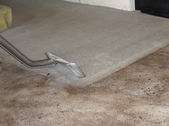Hot water extraction
The Hot Water Extraction (HWE) method, is a method used in chemistry for extraction and for "steam cleaning".[1] The pressurized hot water extraction (PHWE) process uses a combination of high water pressure for agitation, and hot water to increase reaction rate.

"Steam Cleaning"
Though commonly called "Steam Cleaning", no actual steam is involved in the HWE cleaning process, apart from steam that may escape incidentally from hot water. When the cleaning solution comes in contact with the carpet/rug, it is anywhere between 50-120 degrees Celsius, according to the heat available from the cleaning unit. For instance, in a modern truck-mounted carpet cleaning machine, water can be heated under pressure to 150+ degrees Celsius, but after passing through high pressure steel braided hose and several manifolds, the water loses much of its heat.
The typical cleaning method involves a preconditioning of the soiled surface with an alkaline (7 or above on the pH Scale) agent, followed by light agitation with a grooming brush and appropriate dwell time. Next, the surface is passed over several times with a cleaning tool (either manual or automatic) to thoroughly rinse out the preconditioner and, using an acetic acid solution, lower the pH of the fibres to a neutral state. Finally, the surface is dried sufficiently to avoid any possibility of saturation.

Hot Water Extraction Machines
Professional machines range from portable machines, which use electricity to heat the water and power the water pump and vacuum motors, to larger truck mounted machines. Truck mounts are normally stationary gas/diesel engine or PTO powered machines installed in a van or truck. The portable machine is able to access difficult to reach buildings and high story floors, while the truck mount's advantages are its power to heat the water and power of vacuum and faster cleaning and drying times. DIY and rental machines use some of the technology from the professional systems, but with less power and usually without an element to heat water (filling the unit with hot water is advised) the results are limited, these units are not typically called HWE systems.[2]
See also
References
- ↑ http://www.silverolascleaning.com/tile-and-stone-cleaning.html
- ↑ "How to Clean the Most Common Carpet Stains DIY". Retrieved 18 October 2016.
